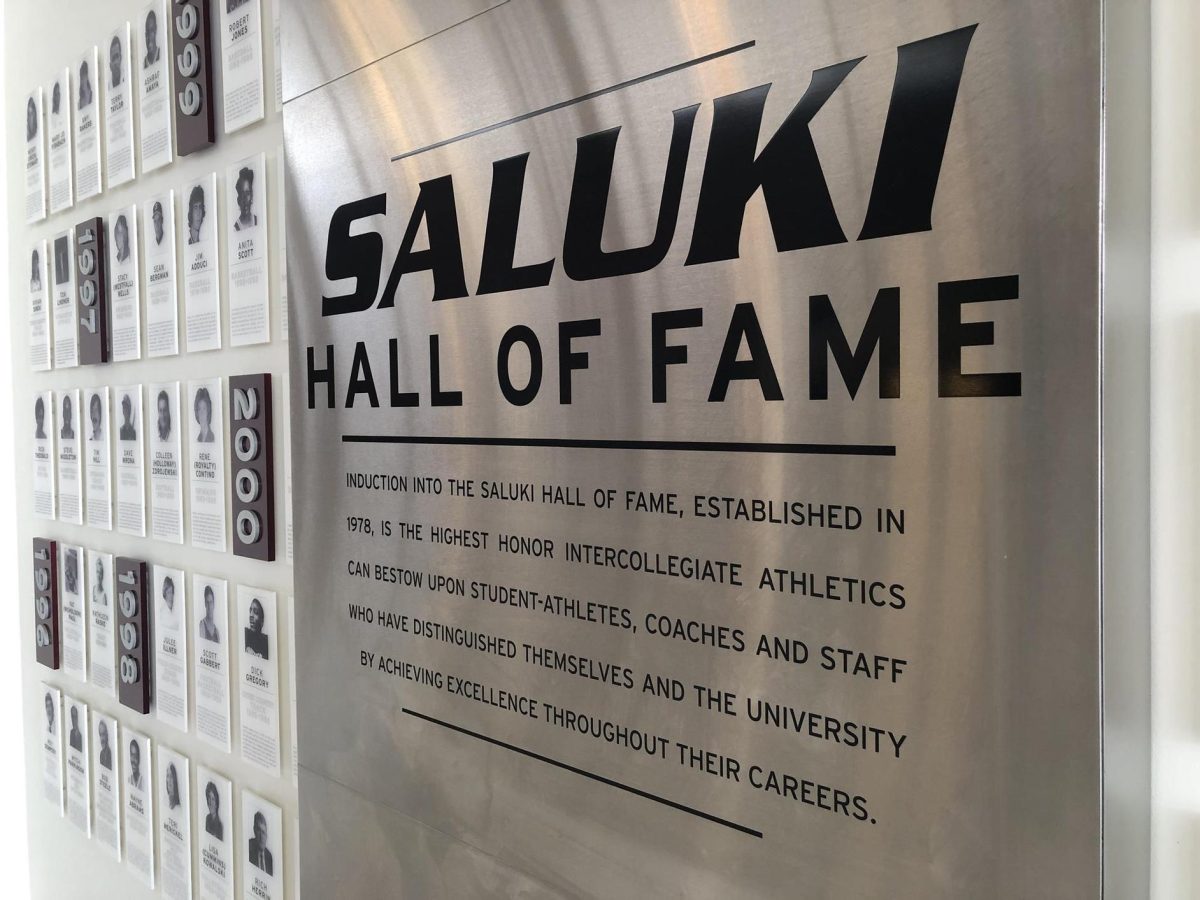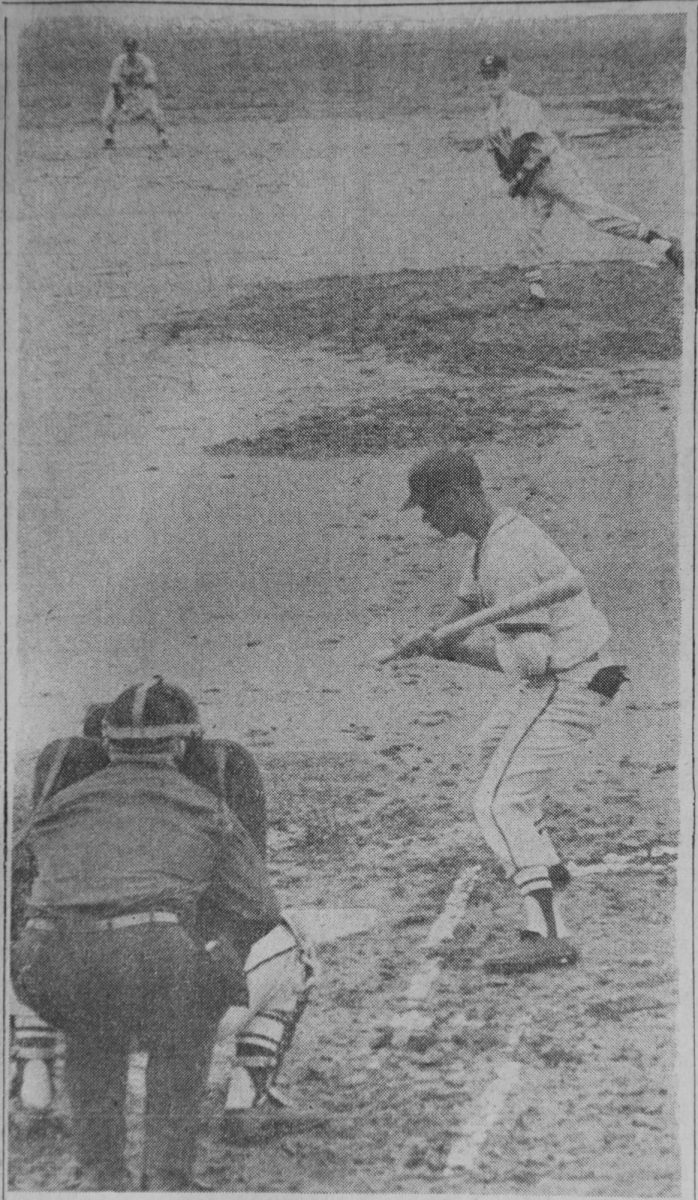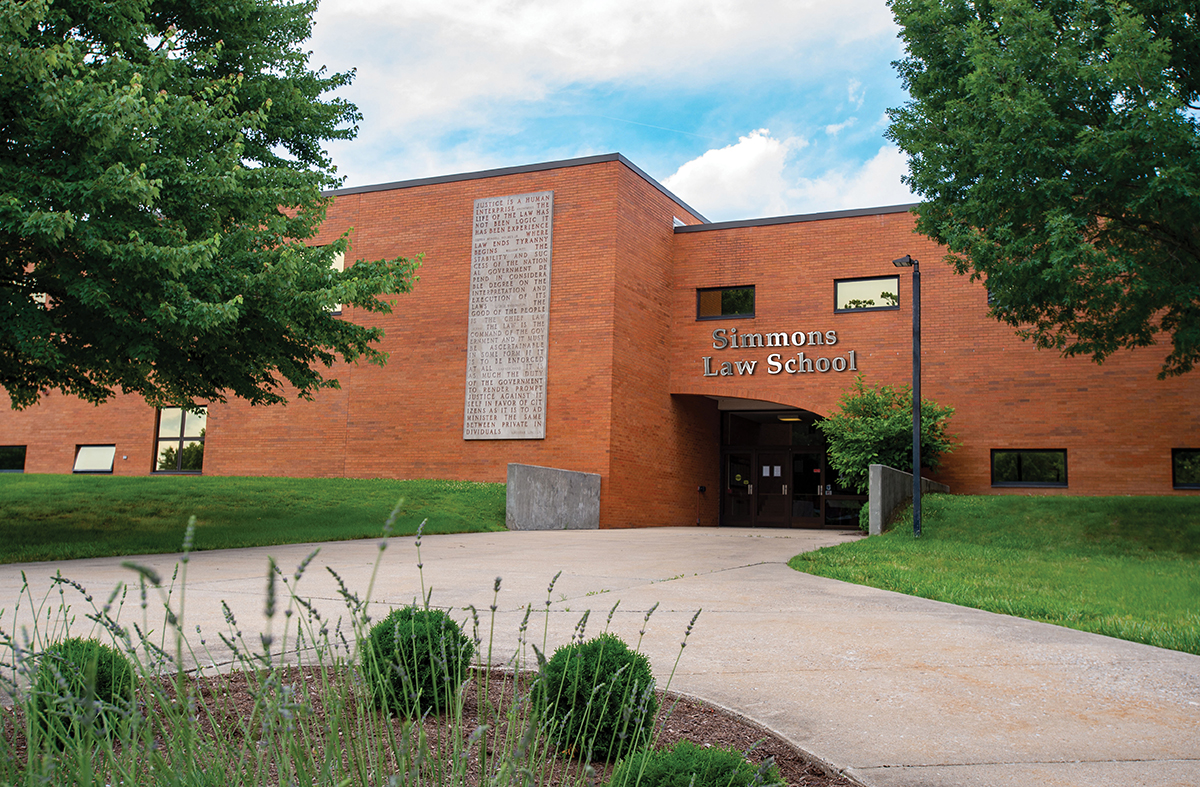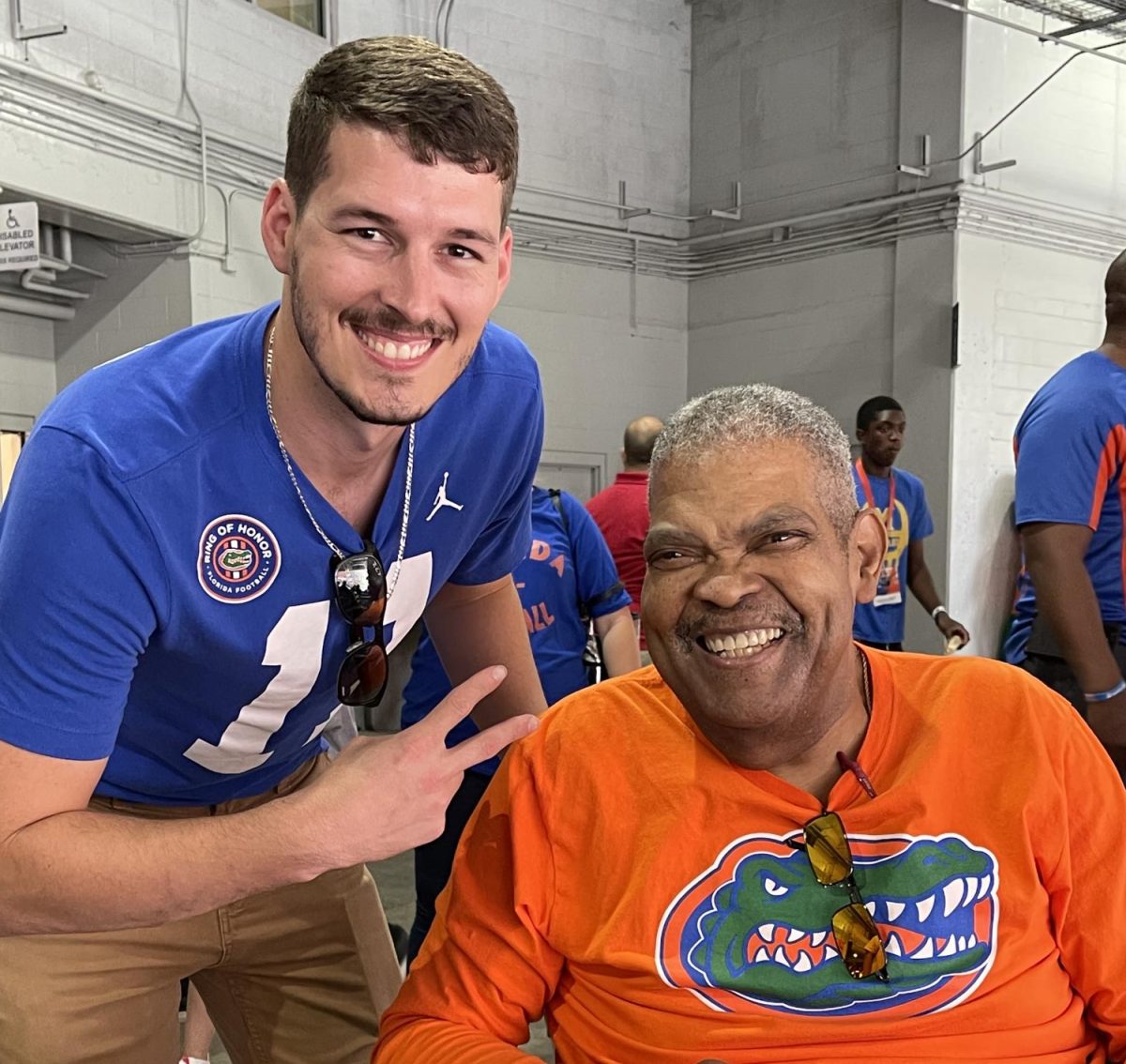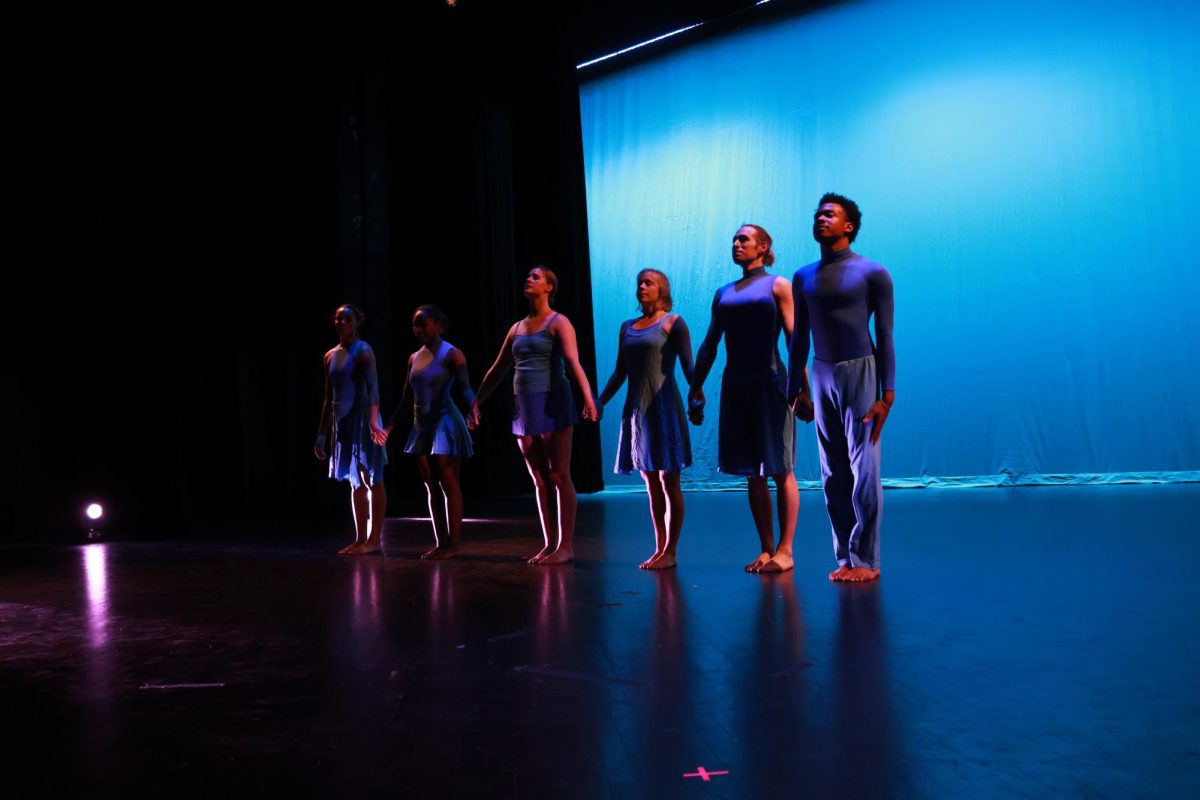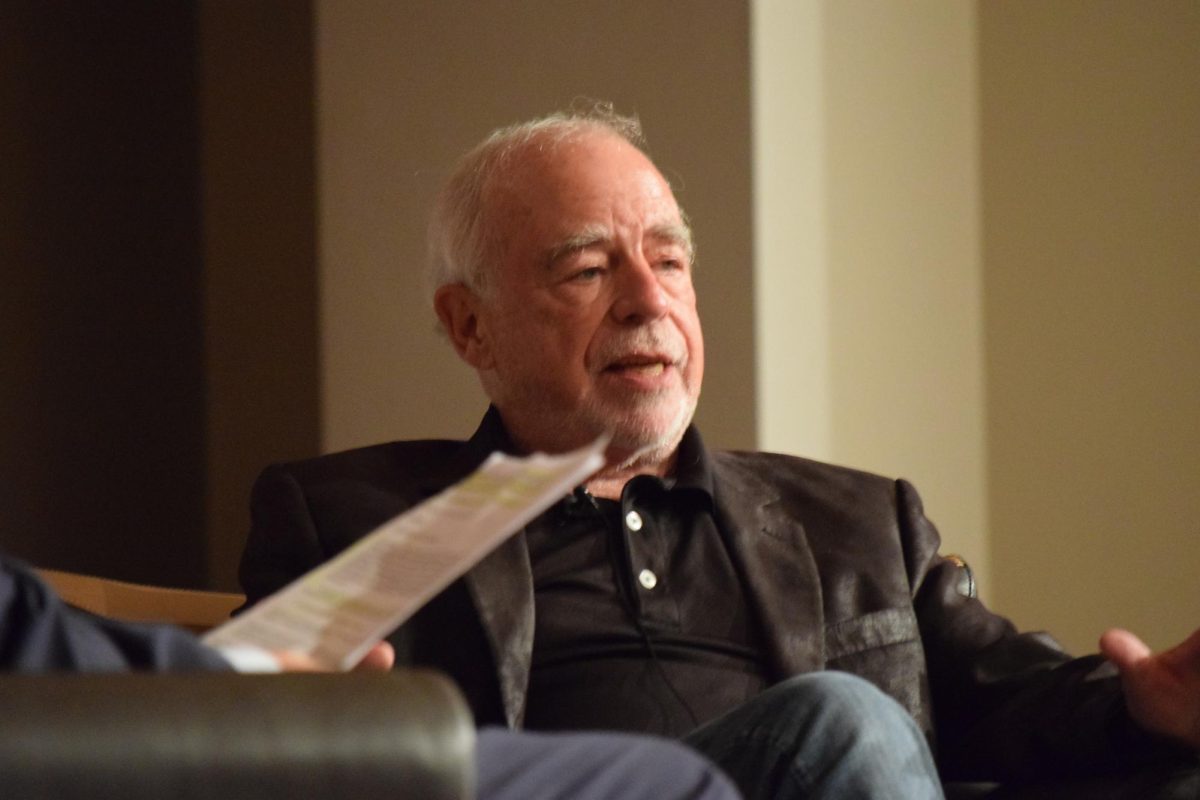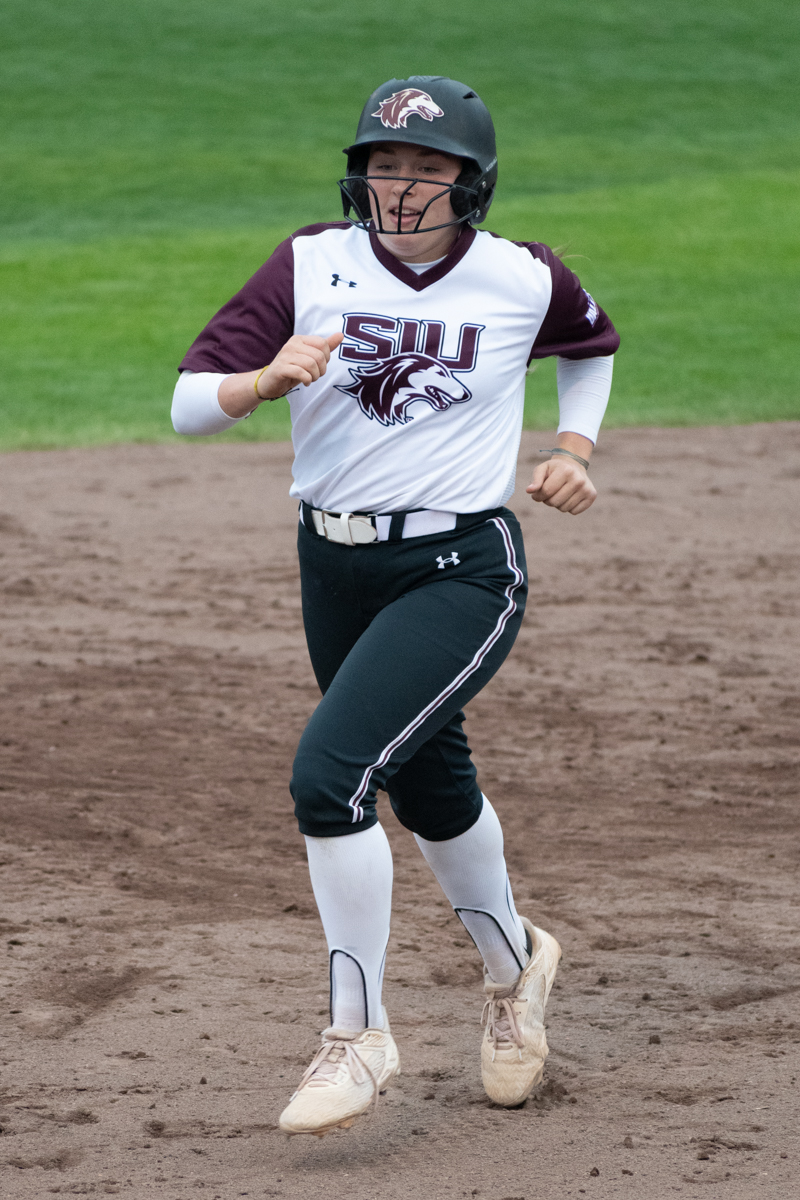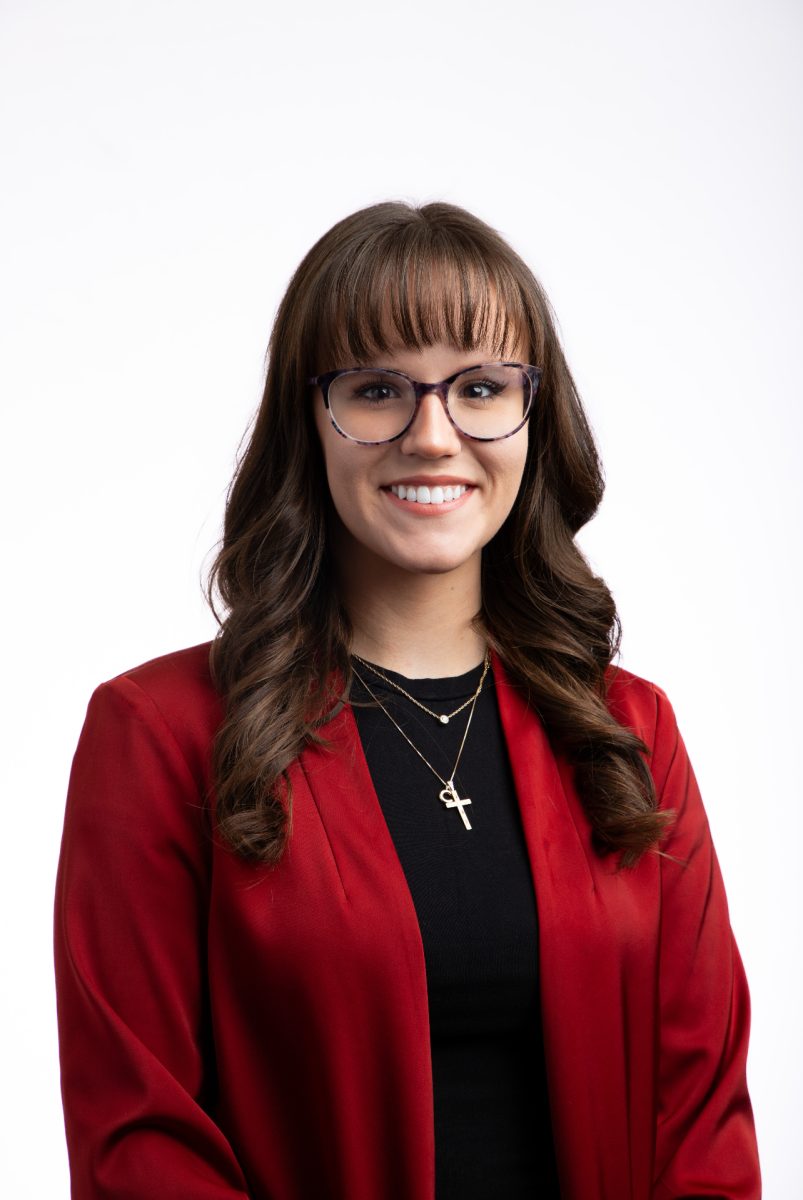This year’s Hall of Fame class for Saluki Athletics features five athletes with careers spanning from five decades ago to as recently as seven years ago. Dewey Robinson, John Marks, Brian Boemer, Dyana Pierre and Taylor Pippen each played various sports during their different tenures at SIU. But now they walk into Saluki immortality together during Homecoming weekend.
The 1983 football Salukis will be inducted as well, the second time an entire team has been honored. This team won the I-AA National Championship, which head coach Rey Dempsey said at the team’s 20th anniversary celebration, he told his friends they would do.
“We thought we were that good coming in…we agreed among ourselves we were going to do it,” Dempsey said.
Advertisement
The squad won its first 10 games before losing their final game of the regular season against Wichita State 28-6. Dempsey described the mindset after letting an unblemished record slip through their grasps.
“They didn’t panic after the Wichita State game. That made them angry,” Dempsey said.
Quarterbacked by fifth-year senior Rick Johnson, Southern averaged almost 30 points a game while limiting their opponents to only seven points in the FCS playoffs. It included a blowout in the I-AA National Championship where they destroyed Western Carolina by a score of 43-7.
It was pure domination on both sides of the ball for SIU as the defense intercepted seven passes while winning the time of possession battle. Southern held the ball for nearly 40 minutes which doubled Western Carolina’s total. It followed a trend where the Salukis averaged almost 33 a game during the regular season while allowing just 14.
The remarkable part was they did this without a true star player on their roster. Even though cornerback Terry Taylor went on to have an 11-year career in the NFL after being drafted in the first round of the 1984 draft, the Salukis were strongly characterized as a team built around guys who played and coached hard for each other.
“We felt nobody was going to outwork us as a staff,” Dempsey said. “And our players worked very hard. It all starts from the top. If you work hard, they will work hard.”
Working hard has always been the story for 68-year-old inductee Dewey Robinson, who is still involved in the game of baseball to this day. He was a part of two Saluki teams which had third-place College World Series finishes in 1974 and 1977. Now Robinson is working in the Pittsburgh Pirates organization as a special advisor for player development.
Advertisement*
It has been a long journey for Robinson, who has five brothers, in order to get where he is now.
“I leaned more into baseball and wanted to go to college, and the only way I could afford it with all the brothers was to try to get a scholarship, so it worked out,” Robinson said.
He is the only player in program history to accumulate both 20 wins and 10 saves. He was primarily a starting pitcher until his senior year, when he began to work out of the bullpen and close out games.
“We had a couple freshman pitchers who were really good, and Itchy Jones, our head coach, told me I was going to the bullpen, and he would make sure I pitched,” Robinson said. “I don’t know if I had any saves as a junior or anything, I think they all might’ve been my senior year.”
Jones was an instrumental part of the success of Robinson, who attributes a lot of what he has been able to do to his former head coach.
“I think of Itchy as like my second father, I’m really close with him…I love the man, he’s had an incredible influence on my career and my life, not only on the field but off the field,” Robinson said. “…I’ve been able to suit up every spring and watch and coach baseball, so I owe a lot of it to Itchy.”
After he was drafted by the Chicago White Sox in 1977, he was able to accelerate to the major leagues thanks to his versatility on the mound.
“Once I went into pro ball, I had a lot of experience as a reliever and didn’t have to learn… got the chance to get to the big leagues pretty quickly because of the experience I had at college,” Robinson said.
His big league career included 30 appearances across three seasons where he struck out 35 batters with a 4.05 earned run average. But when his playing days were over, Robinson transitioned fairly quickly into coaching, which was something he always had his sights set on.
“It was something that I was driven to my whole life, even when I was a player. I just wanted to stay in the game the best I could,” Robinson said. “Playing at the professional level opened up a lot of doors in coaching because I had a higher level of experience than most, being able to pitch at the major league level.”
Initially, after sending resumes out to anyone in the Illinois area who would receive them, he went to Northwestern University in a volunteer role, as they were the only place to respond. He got valuable experience and was able to learn what he needed in order to move to professional coaching positions down the road, including stints with the Chicago White Sox, Houston Astros and Tampa Bay Rays.
From his freshman season in 1974 at SIU to the present day, Robinson has seen the evolution of the game and how it is interpreted firsthand.
“It’s incredible the strides that have been made in the game…When I played, lifting weights was frowned upon, now these kids are in incredible shape,” Robinson said. “So it’s changed drastically where we’re going, and I’ve adapted to it, if I didn’t, I wouldn’t still be coaching or in the game…”
Robinson considers the basics of the game: be a good teammate and work hard. It was a microcosm of his work that he instilled in players of all backgrounds across decades where he put his all into making sure everyone he came across had the opportunity to meet their goals of playing on the big stage.
“I’ve always felt that I wanted to treat everybody equally, no matter if they were a free agent, a first rounder, from Latin America, from Asia, from Cuba…that they all matter, and they all have a chance, and I was going to do everything I can to help them reach their dreams and get to the big leagues,” Robinson said.
After watching teammates go into the Saluki Hall of Fame, the fact of being inducted himself never really struck Robinson. But when he got the news on a phone call, he became emotional because of the select few that share the honor.
“I just am so thankful for what Southern Illinois University and the baseball program, and the coaches and my teammates did for me, and my life, I enjoy the heck out of it. It put me on the path to be able to wear this uniform,” Robinson said. “…I brag about Southern all the time and I’m really just grateful and humbled to be going in, and excited to come in that weekend…”
Star shot putter John Marks, also said it’s a privilege to be recognized as one of the greatest Saluki athletes of all time.
“I feel honored to know that somebody had seen what I accomplished at SIU and gave me this honor of becoming a member of the Hall of Fame,” Marks said.
Simply wanting to become a stronger football player in high school, Marks joined track and field to put on some muscle. As he progressed, Marks was taken aside by his coach and told he could win a state championship.
Sure enough, in 1975, Marks won the Illinois state championship for shot put, and several schools reached out to him. Wanting to live out his dream of being a Chicago cop, Marks chose SIU because of its administration of justice program.
“I had 3 relatives that were Chicago firemen, and I was going to buck the trend and become a Chicago policeman,” Marks said.
SIU’s track program at the time also raised up George Woods, a U.S. Olympian, who Marks watched film on to pull technique from and all but confirmed his decision to attend Southern Illinois. Little did he know, he would go on to break Wood’s freshman record and become a two-time All-American in the indoor shot and two-time MVC champion for outdoor shot.
“At the time, you didn’t think much of it, you’re doing the best you can…but me looking back, I think things have grown on me, that ‘boy I accomplished something there and I’m pretty proud of it,’” Marks said.
Lew Hartzog coached track and field for the Salukis at the time, and Marks credits him for being the reason he attended college considering he wasn’t a high achiever academically. Although the WWII veteran and Marine in Hartzog was initially off-putting for Marks, he realized a like-mindedness in their will to win.
“Lew, he was a unique individual. He was very stern, I thought at first, I was kind of afraid of him…So it took me a little bit of time getting used to it, but once I found out what his goals were, they were my goals,” Marks said. “Lew had a unique way of getting people motivated and compete the best they could.”
Marks was roommates with another Saluki Hall of Famer, Stan Podolski, for three years, and it always kept him on his toes. Even with track and field being an individual sport in most cases, the camaraderie that Marks and his teammates shared drove them all to be better.
“I never took for granted what my teammates did…we had a very close-knit team, be it sprinters, the distance runners, the jumpers, pole vaulters, everybody, we were really close,” Marks said. “So I thought that was a great motivation, you wanted to do the best for your teammate and that’s what pushed us a lot.”
Marks competed at a time when concepts like nutrition and training weren’t nearly as significant as in today’s society. It was tough for him to maintain a specific weight and watch the film he needed to get better. The differences in technology are night and day on how athletes can improve themselves.
“Nowadays, you can get on your phone and look things up and determine what’s the best thing to eat. Back then, you had to go to the library and get a card and go to the card catalog and search for a book and read about these things,” Marks said. “I had to watch 8-millimeter film on a projector back then…[the phone is] a great asset for the current athletes now.”
Marks went on to fulfill his dream of working in the police force, becoming an Illinois State trooper, then moving to investigations as a special agent for the majority of his career. But in 1999, he contracted an AVM, an arteriovenous malformation, which meant he had a blood flow disruption to his spinal cord that shattered its functionally.
Although he has been a paraplegic for a quarter-century, he is grateful to his alma mater for how he has been able to deal with this disease.
“I think my years at SIU helped me with my recovery from that… I was able to put my training at SIU to good use, I was able to set a goal of being as healthy as possible and I knew how to achieve that goal, and I think I’ve done pretty well for the last 24 years in my wheelchair,” Marks said.
Overall, Marks said he is proud of what he has been able to do and that it couldn’t have been possible without being a Saluki.
“I’ve hoped I’ve contributed to the legacy of the SIU throwing program…if I wouldn’t have got the opportunity to go to SIU, I don’t know what,” Marks said. “…I can’t imagine my life without track and field and SIU being a part of that.”
Inductee Bryan Boemer was another All-American and was one of seven offensive lineman to be named to the All-Century team for SIU. Even with anchoring the O-line at the center position from 2008 to 2011, it still was a shock to Boemer when he received news about the Hall of Fame.
“It’s awesome man, wasn’t expecting it…kind of caught me off guard. It’s kind of a surreal feeling, it brought back tons of memories…and all I could think about was the 5 years I spent at school and how awesome it was,” Boemer said.
Boemer started his final 35 games at SIU while also being a part of units in 2008 where the team possessed a top-five rushing offense. In his senior season, Boemer held a 93% blocking percentage while not allowing a sack.
He wasn’t always a dominant force, and it took him being receptive to instruction to become as great as he was.
“I think the biggest thing that I did was I was able to stay open and be coachable, our coaches…I mean those guys have been around the sport a long time, they know what they’re doing, so I think sometimes the hardest thing for a player is to open up and actually do it,” Boemer said. “They’re there to make you a better player and all you gotta do is listen and put in time and effort and I think that’s what kind of helped me stand out was I was a coachable player for those guys.”
Weighing around 320 pounds with a 6-foot-2 frame, he wasn’t the strongest compared to the guys he matched up with at the line of scrimmage. But he stressed the significance of using his feet in order to be effective.
“Footwork’s the biggest thing as a lineman and especially a center. You can ask any of the guys I played with, footwork’s everything,” Boemer said. “Strength’s good to have but sometimes the best lineman aren’t the strongest ones, they’re just real sound in their technique and that helps with everything.”
In his senior season, Boemer was named the best center in the country via the Rimington Award and was a First-Team All-Conference selection twice. These awards gave Boemer a chance to see that his effort behind the scenes was showing on gameday and being recognized.
“They were awesome, it gave me a scale to know how hard you’ve worked. Knowing that there’s hundreds of other people out there trying to do the same thing, it’s nice knowing that the hard work and effort and the long days in the gym, the long days in conditioning, and the long days in practice, that they all paid off,” Boemer said. “For me, they were like a finish line, and I reached it.”
But none of these accolades stood out to Boemer compared to when he was named a leader in the locker room.
“When they told me I was captain, that was the best feeling I think I’ve had. I think that supersedes any of the awards I won at Carbondale, was being able to lead a group of around a hundred guys, man,” Boemer said. “To have them look up to you, when something’s going wrong, they’re looking at you to figure something out, that’s a great feeling.”
At first, after graduation, Boemer went into sales at a desk job but he quickly realized that it didn’t suit him. Instead, he moved to working in the fire department where he found some similarities to being on a football team.
“I love being part of a team so much and that’s ultimately like a profession I wanted to do. On top of that, you get to help people and be part of a team to achieve goals and I feel like football, for sure, gave me a super leg-up in being prepared for a career like this and ultimately kind of drove me towards it naturally,” Boemer said. “Not a guy that can stay behind a desk, I can tell you that, tried it, didn’t work very well.”
A desk job, however, is the selected path for inductee Taylor Pippen, who is now involved in banking. After playing volleyball professionally in Spain, she enjoys her job back home in Chicago. But just eight years ago, she was a vital piece of the SIU volleyball program. It was a quick turnaround into SIU immortality which was thrilling for Pippen.
“To get the news was a really big honor. It was something that I was hoping for, but you can never expect it, so I was super excited to get the news,” Pippen said.
She got into volleyball by going to the tryouts in high school to give some moral support to a friend. But she found a love for the sport and was able to grow as a player thanks to coaches around her.
“I have to give credit to the coaches that I had over the years. They really put their time in developing me as a player,” Pippen said.
Combining what she learned from coaches along with a natural want to be great at everything she did, Pippen was a force on the floor in her time at SIU. She was the first three-time All-Conference player in program history, awarded to First-Team All-MVC twice, was a MVC Scholar Athlete three times and named an All-American after her senior year. The accolades reflected the effort she put in and pushed her to keep going.
“I would say that they were encouraging, they kind of let me know that all the work I was putting in meant something, and it was just a testament to the work I put in over all the years,” Pippen said.
She holds the school record in block assists (426) and hitting percentage (.345), and her strong play was shown on the big stage after the 2015 team went 23-10, the best in program history, and went to the NCAA Tournament. Being with her teammates and hearing their team being announced on the selection show was an unforgettable experience for Pippen and her teammates.
“It’s definitely one of the highlights of my life to be honest. That feeling was incredible to know we were the first team to ever make it to the NCAA Tournament in school history, so it was just an incredible feeling that I’ll never forget,” Pippen said.
Although they lost the only game they played in the tournament to Illinois, It was the first of its kind for Saluki volleyball and Pippen believes it was a breakthrough that will have an everlasting effect on the program.
“I think we made a huge impact, being the first team to get that recognition and make that history, we’ll always be the first team to make it to the tournament…it’s just an incredible thing that I can share with my teammates for the rest of my life,” Pippen said.
It also didn’t take long for the best rebounder and shot blocker in SIU’s women’s basketball, inductee Dyana Pierre, to be recognized as one of the best athletes to play for SIU. These records led many around Pierre to ask when her induction would inevitably come, so it was big for her when she got the notification.
“I used to get questions, ‘when is it going to happen’… It will always be a surprise to me, I never would’ve thought I would be in anybody’s hall of fame even though I feel like I deserve it looking at the stat sheet,” Pierre said. “But I think I’m still in shock and it hasn’t hit me, and I think it will be…when I get up there.”
Her tenure at SIU got off to about as rocky of a start as possible when she tore her ACL in the summer before her freshman season. It showed her the importance of not only physical health, but the mental as well so that she could be in the correct mindset to come back on the court stronger and better.
“Honestly, it’s really about being in shape, you have to be in tip-top shape at all times and be good mentally, on the court, off the court. A lot of people don’t talk about the mental health of athletes. It plays a part in how you play in each game,” she said.
It forced her to step outside her comfort zone in order to get the help she needed.
“I’m really not the one to reach out to people but I really had to put my pride aside and ask people for help. That was a really dark time for me, I thought it was over with, I was young, I was like 17 going on 18, my parents weren’t around, [I was] far from home,” Pierre said.
She was fortunate to have a strong support system around her at SIU.
“I really thought everything was over but my athletic trainer at the time, Kristin, and my teammates, they all made sure I was good, and I was being level-headed and not staying in my room too much and making sure they were pumping me up like ‘you’re gonna get back’,” Pierre said.
When she returned in 2012 for her true freshman season, she made her presence felt, instantly leading the MVC in rebounding (8.6). Over the years, Pierre continued to get better on both sides of the ball.
She was named to first-team All-MVC for the next three years and was only the second Saluki to ever do that. Pierre was also named to the MVC All-Defensive team for her last two seasons. Even now, she said, she still asks herself how she was able to do these things.
It obviously takes hard work and skill to rack up accolades like this, but Pierre said being effective at the rim seems routine to her.
“Other than my size and my hands, it was really just having a knack for rebounds. I mean my high school coach used to teach us how to read the ball coming off the rim on the shot and I really just bully my way in there and I time it well,” Pierre said. “Maybe it’s natural, I think it’s just natural.”
She also watched videos of some of the best to do it when it comes to rebounding and playing defense at the professional level. Pierre paired this with playing whenever she could and listening to all who gave advice and it clearly propelled her play on the court.
“Just watching videos of Sylvia Fowles, Dennis Rodman, all the time in college, watching the men play, playing against men at the Rec sometimes. It’s a lot of people that I could thank that got me to where I am today,” Pierre said.
Pierre is currently traveling the world, playing the sport she learned that she loved thanks to playing overseas.
“At that time I knew nothing, I was scared. But once I started getting past my rookie year, I realized that I do love basketball,” Pierre said. “Because playing overseas professionally, it really does something to you, it makes you really know what kind of player you are.”
Pierre has learned that hard work towards your dreams is important and not to be disheartened by the bumps on the way.
“I really want people to know that no matter what you go through…remember your goal at the end of the day…” Pierre said. “You really have to just keep working and it will all pay off and everybody will see it, and just don’t get discouraged.”
Whether they are still involved in their sports like Robinson and Pierre, or they found their passions in other avenues like Marks, Boemer and Pippen, all these athletes hold profound impacts at SIU and contributed to the story of Saluki Athletics. Along with the championship winning football team of 1983, this year’s hall of fame class is filled with prestige and prowess.
Advertisement



